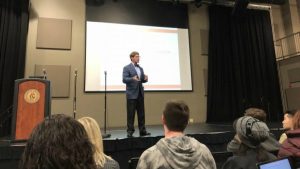Editorial response: Why stay at Simpson College?
February 23, 2018
Just over a year ago, I found myself at the place where I had to make a decision about my future at Simpson College. As some may know, I had arrived at Simpson in the summer of 2016 expecting to be at the college for only one year as interim academic dean.
However, when Simpson asked if I would consider staying beyond one year, it didn’t take me long to say yes. After reading The Simpsonian, it seems like I was in a similar situation to many now on campus. In light of the prioritization process, some are asking the question, “Why stay?” I share here some of reasons I stayed with the hope that some may find it helpful.
The primary reason on my list was the quality and integrity of the staff, students and faculty of the college. Excellent facilities are great, but at the end of the day, the value of our relationships is what matters most. Having served at seven universities and colleges, I have yet to see a peer institution that can match the potential that our students have for a quality educational experience that will be beneficial for the entirety of one’s working years. The experiential learning at Simpson imparts knowledge and helps encourage dispositions that will transfer readily from the various careers students are likely to have in their lifetimes.
Faculty and staff know, and students experience, that deep and transforming learning takes place best in the context of relationships in which students, staff and faculty work together. All colleges talk of student-centeredness, while Simpson puts the principle into practice.
The students of the college themselves compel me to put down roots. Issues of justice and equality are priorities for many of the students I am blessed to work with. I am so bold as to think that as a result of their character, grit and humility, Simpson students will continue to work for a more just and verdant world and will not stop tackling the most urgent environmental, spiritual and economic challenges of our day.
The entrepreneurial spirit at work on campus that saw the need for a Culver Center, Emerge, Carver Fellows, opera and other cutting-edge programs also keeps me at my post. It is this orientation toward future opportunities that is gestating new programs that are uniquely Simpson.
Many colleges are asking the wrong question: “How do we hold onto, keep and tweak the same dusty programs we’ve always had?” They lack courage to tackle program prioritization. Simpson asks: “What opportunities and challenges are becoming visible on the horizon? How do we prepare for that emerging reality?”
It seems a better question than “Why stay?” is, “Why would I leave?” Like the gardener lovingly pruning her roses, we fully anticipate that the natural process of thinning will help the college as a living organism grow stronger in both the near term as well as the future.








